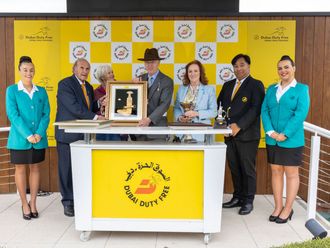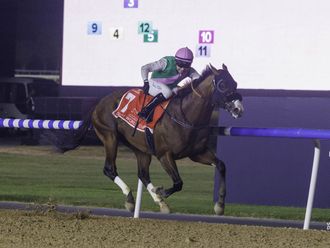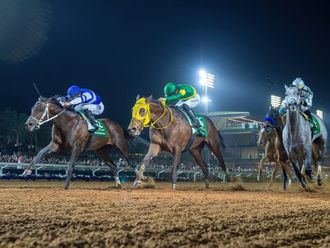Abu Dhabi: Leading officials, experts, veterinarians, trainers and jockeys connected with Purebred Arabian Horse Racing began deliberations at the Shaikh Mansour Bin Zayed Al Nahyan Global Arabian Horse Flat Racing Festival’s Fourth World Arabian Horse Racing Conference at the Centre de Congres Pierre Baudis in Toulouse, France, on Thursday.
In the opening session on breeding, the UAE’s Khalid Al Naboudah and Iraq’s Ali Al Haddad highlighted the challenges they face in breeding in the Emirates, while Kathy Smoke and Sam Vasquez said breeding was not a problem in the US and it was more economic factors that baulked Purebred Arabian racing.
“Breeding is a challenge for us in the UAE. We import everything and the weather is not helpful. We are fighting hard and struggling against many internal and external factors and, above all, the tough weather conditions pose the real challenge,” Al Naboudah said.
“I believe in the importance in the mother’s bloodline, but I don’t agree it’s 75 per cent for the mother against 25 per cent for the stallion. I think its 50-50.”
Smoke said: “We are doing a very good job to preserve this noble creature. Arabian horse breeding is flourishing in America but, like other industries, it was hard-hit by the recent economic problems. We have enough races but we don’t have enough horses and this is the dilemma. I invite others to send their horses to race in our country.”
Fellow American Vasquez added: “We have good stallions and mares but the breeding industry is not very attractive and this is correlated with other factors including marketing. The whole process depends on what returns small breeders can earn and whether this is encouraging or rewarding is a very big question.
“I have been breeding for satisfaction at the beginning, but now I’m making profits. I understand in all bloodlines one must know how to select the right stallion for the right mare. I hope breeders would be more professional.”
Al Haddad confirmed that breeding was challenging in the UAE. “If I would like to send my horses to US to race there, it may cost me $50,000 per head. Nobody is helping us in this,” he said.
Kishore Mirpuri (India/Poland) said: “We have good Arabian horses in Poland and they do well against their Russian-bred horses on many occasions. I think breeding is promising in Poland and I think we need to mix horses for example from Poland with stallions from Russia and definitely the product would be fascinating. We need to have the qualities of the Arabians mixed.”
Earlier on Wednesday night, at a well-attended press conference, Lara Sawaya, Director of the festival and Head of the International Federation of Arabian Horse Racing Authorities (IFAHR) Ladies Racing, thanked French officials for their support in staging the conference in Toulouse.
“Among those attending the three-day conference and the two races on Sunday we have eight envoys, around 75 journalists from all over the world, as well as some of the most well-known officials involved in Arabian horse racing,” she said.
“Apart from five tickets, which will be raffled for free, we will also be giving away five awards in the form of jewellery for those who shop at Galeries Lafayette. For the first time we will be awarding expensive watches for the winning trainers of the Shaikh Zayed Bin Sultan Al Nahyan Cup and the HH Shaikha Fatima Bint Mubarak Ladies World Championship (IFAHR) races, which will be held on Sunday.”












